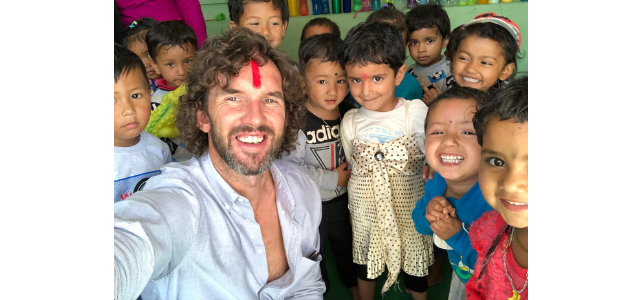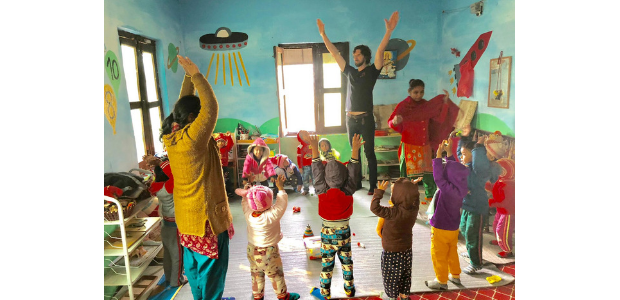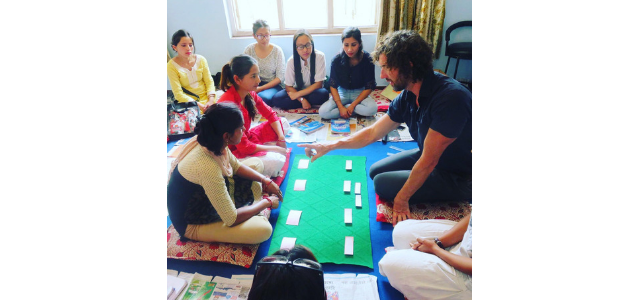Principal of Farmhouse Montessori School, Sydney; teacher with over 20 years of experience across the globe; mountaineer; advisor to numerous schools on pedagogy and teaching; philanthropist; co-founder of educationinfluence.com, an initiative to connect teachers and educators across the world; LinkedIn Global Goodwill Ambassador for Australia, 2017 and nominee for Australian Author of the Year, 2017. We are talking about Gavin McCormack, the man who has been revolutionising education world over. Aaqilah and Sweta from the Knowledge Tribe caught up with him, amidst his busy travel schedule. Here’s part-2 of this interview.
Click here to read part-1.
Gavin McCormack: : That’s a very interesting point. There are three strategies that I use, which you can share with your readers. The first is to make it personal. You need to have your face out there. For example, I am in all of my posts. So, it is not that I am just preaching, but people see that I am doing what I tell others to do. This way you are building a rapport with your audience.
Number two is- don’t sell anything. I am not selling anything to anybody. A lot of people say, ‘Hello, I would like you to follow me, login to my website to buy this and call me for this’. Ideally, people delete those messages, because they don’t want to be sold anything. You are on a platform to make connections and to educate yourself.
The third important thing is to be humble. I am not asking you to believe me; I am not telling you that this is the right way. I am just telling you that this is one of ways via which it works. You don’t have to do it, but you can if you like. Nobody likes arrogance. I am not saying I would influence and my platform also doesn’t say that I am an influencer; it just says that I am a teacher, because that’s what I am.

KT: Let’s ask you something practical. We are sure that you need to deal with families, because parents may not want to educate their children or the girl child. What do you do about this?So, you do these three things, and you will win. I started with one follower and reached a hundred thousandfollowers sooner than I had imagined, so it works, but it takes time. But you need to remember that the response is not always going to be positive. I get lots and lots of positive messages, but I also get lots of negative ones. However, at the end, I know that what I am doing is for the right reasons. It is not about me. In fact, I travel during my school holidays for this cause. So, it is definitely not about me.
GM: Well, some cultural differences are very hard to deal with. For example, if you are teaching in Afghanistan, girls are not allowed to go outside their house. So, it is very difficult to deal with that. But I firmly believe that education starts at home. In a month, a child can attend only around 120 hours of school, when compared to 500 hours of education at home. So, the first job of any school, school leader or the administration is to meet the parents and get them on board. If you haven’t dealt with the parents first, then you are fighting a lost battle. Educate the parents and tell them about the school philosophy, about what the school promotes, and that you expect them to promote the same at home; because if the school is promoting one thing and the parents are promoting another, the parents will always win.

KT: Tell us about a couple of memorable experiences that you have had across the globe.
GM: Okay, I can think of so many memorable experiences. The first would be when I was in a small village in Kavre, Nepal, in 2017. I was building a school there. I run a charity to raise funds for the schools in Nepal and build one every Christmas. So, I invited the children of the village to attend an art class. I had set up some tables, and when the children came, I showed them how to draw a picture on a piece of paper. These children had never seen a piece of paper. When I was drawing the picture, the children’s eyes were popping out; they couldn’t believe what I was doing! How was I drawing a picture of a tiger? They were so amazed. I told them to take some sheets of paper and paint their own pictures. Approximately a hundred children were there, and they painted flowers, trees, houses, and nearly everything. One girl named Pooja, who was around eight years old, walked towards me and handed over a piece of paper. She had painted a picture of me and her and asked for another piece of paper. This brought tears in my eyes. I realised that all she needed to be happy, was the sheet of paper. In today’s world, people want Versace, Gucci and other brands and mansions of money, but the simplest thing is that we need to make others happy. These kids don’t need material things; they just need these simple things.

KT: That’s beautiful.
GM: Yeah, the other memorable instance is when I built another school in south Nepal. One day, the sun was about to set and a man got down from his bike and walked up to me. He was probably 80 years old. He shook my hand and said “Hello”. I replied, “Hello”. I asked him where he was coming from, but he couldn’t speak English, so I asked someone to translate to him. I was told that he had read in the newspaper that I was coming to his village, so he rode around 150 km on his own, just to meet me and say ‘Hello’. That was beautiful.
KT: Wow. That’s really amazing, Gavin. So, last question from us—how would you define knowledge?
GM: That’s a very, very hard question, but it think that it’s very simple to answer. So, knowledge in my understanding is being able to understand what problems we would face in the long term and gathering a set of skills, either by yourself or within your community, to be able to tackle those problems as a team. I have a really good analogy for this. As an individual, you may have a skill—you are a writer, so your skill is writing; I am a teacher, so my skill is teaching. So, when I went to a village in Nepal, wanting to build a school, I sat together with all the people of the village. I asked them if there was a carpenter in the gathering. Someone raised their hand. I asked him if he could make shelves, and he said yes. I asked if there was a bricklayer. Someone said yes. I asked if anyone knew plastering. Someone raised their hand. So, the people of that village had the combined skills to build a school, but they didn’t realise that they could work together and solve their problems. Two weeks later, a school emerged. After I left the village, they built three more schools without me. I think that’s what the Knowledge Tribe is about as well. That’s probably why you have the word ‘tribe’, which symbolises a group of people working together. This is always the analogy I use when people ask me this question.
KT: Brilliant. Thank you so much for your time, Gavin. This has been an absolute pleasure and a beautiful experience.
GM: Oh, I am really happy to be a part of this. Looking forward to catching up with you guys again soon.

